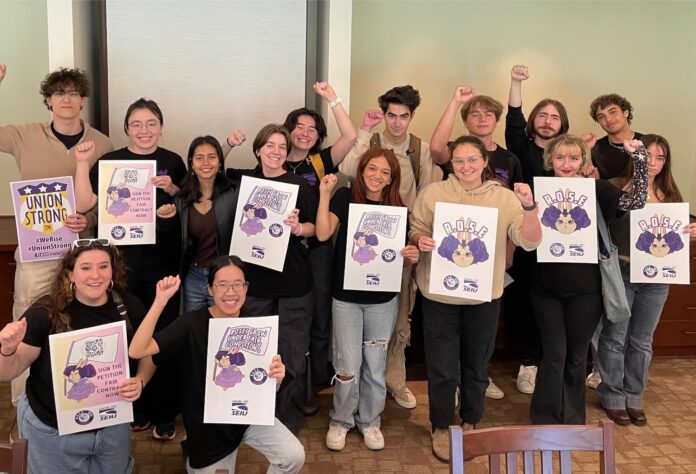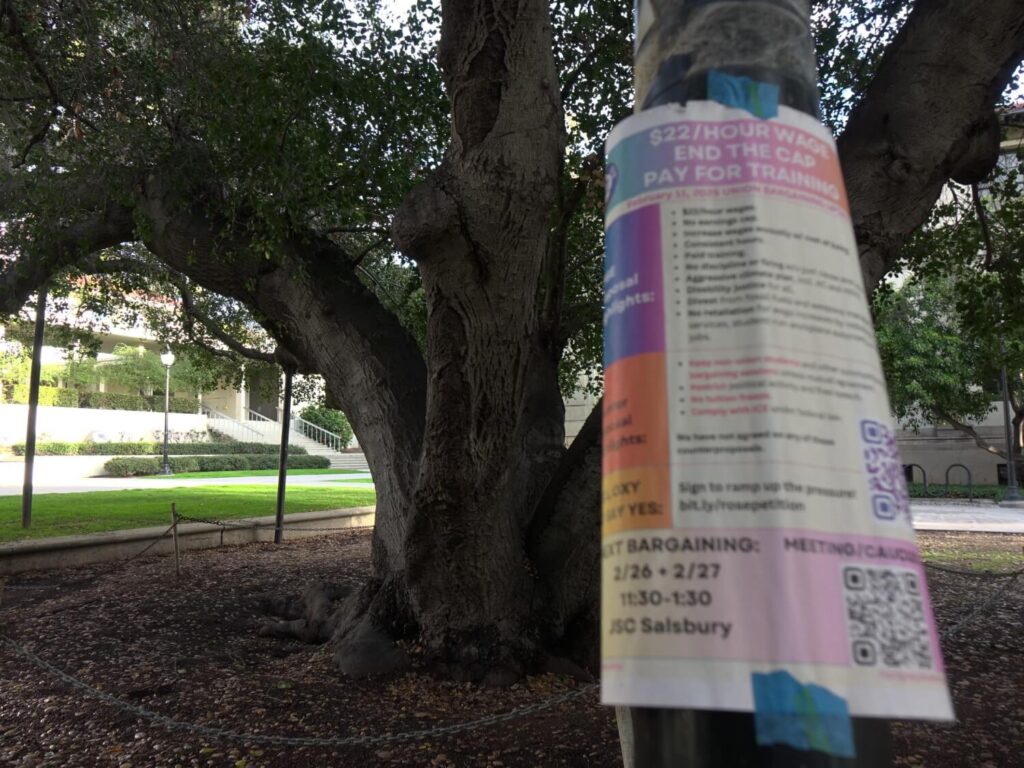
With student workers present, bargaining representatives from Occidental and Service Workers International Union (SEIU) Local 721 met for the third time Feb. 11. According to the Information for Student Workers page on Occidental’s website, SEIU presented seven of its initial proposals during the meeting, including the climate justice, health & safety and wages proposals, bringing its total number of proposals to 10. Occidental has presented 16 proposals.
Center for Community Based Learning bargaining representative Emma Galbraith (senior) said the climate justice points, which she helped draft, are important to her.
“The health impacts of these climate disasters, as they continue to ramp up — I think it’s really important for the college to be addressing that,” Galbraith said. “Both as a general student well-being issue and also as a literal health and safety workplace issue.”
Occidental’s General Counsel Nora Kahn, a member of the college’s bargaining team, said that things are moving along.
“I’m hopeful that, now that we have some proposals on the table, we can move forward more quickly and approach what I expect to be a middle ground,” Kahn said.
Galbraith said a lawyer from SEIU and representatives from Rising Occidental Student Employees (ROSE) present proposals during bargaining sessions.
“It’s student workers running the show,” Galbraith said.
SEIU’s initial wages proposal eliminates the college’s earnings cap and states that “no bargaining unit member shall be paid less than $22 per hour as a base wage, or its equivalent in stipend,” with the base wage increasing at the same percentage the college increases tuition each year.
So far, all proposals being negotiated apply to both bargaining units of student employees, Kahn said. According to Kahn, the college is trying to keep the topics on the bargaining table specific to student employment. The college and the union may have differing perspectives on whether SEIU’s climate justice, health & safety and endowment transparency and divestment proposals directly relate to student employment and are within the mandatory subjects of bargaining, Kahn said.
“Much of the climate justice, health & safety proposal ventures out into other topics that I think are important for students, and many students are interested in and activated around those topics, and I think that’s great,” Kahn said. “But in order for the parties to really make progress towards a contract, I think we’re going to have to concentrate more on the central components of student employment — things like wages, work hours and locations, training — the true terms and conditions of employment.”

Kahn said she expects the college to present a counterproposal at the next bargaining meeting in late February.
The climate justice, health & safety proposal includes 21 sub-provisions, including the conversion of all lawns on campus to native grasses and plants; retrofitting of all dorm buildings; a carbon neutrality plan; and that “the College and the Union will explore the feasibility of retrofitting campus pavement to become permeable for the purpose of reducing runoff, controlling pollutants and reducing heat island effect on campus.”
According to Galbraith, endowment transparency and divestment is another SEIU proposal that she is passionate about. She said Occidental’s resolution regarding climate change and endowment investment policy has been insufficient and lacks an enforcement mechanism.
“What’s so important to me — that we have these common good articles in our contract — is that by weaving them into a labor contract we, the student workers, have the ability to enforce that contract and hold the college accountable,” Galbraith said.
According to Telefund bargaining representative Casey Scott (sophomore), the divestment article has three main points: divestment from fossil fuel companies and firms committing human rights violations, giving students a voice on the Board of Trustees during endowment discussions and establishing a human rights framework for future investments.
“We have a vested interest, one, in the school itself, as student workers. We go here every day, we rely on the vestiges of the college to propel us into our future employment […] we want to have a say in where the money we get paid out of comes from,” Scott said.
According to Kahn, there are other representative bodies for students to bring about change at the college, like ASOC and Sustainability Fund, a branch of ASOC.
“SEIU […] is representing students only with respect to its terms and conditions of employment, not for all purposes,” Kahn said.
According to Kahn, at the start of the bargaining process, she hoped negotiations would be streamlined with straightforward proposals applicable to the entirety of the student workforce brought to the table.
Galbraith said workers need to be represented fairly across the diversity of employment roles on campus. According to Galbraith, the variation between positions is the reason that ROSE will ask SEIU to present a counterproposal to Occidental’s initial union stewards proposal, which specifies that the union appoint no more than six stewards per year.
“If you only have six union stewards — whose job it is to help every student worker on campus through the grievance process or other workplace issues — that’s going to result in a weaker union,” Galbraith said.
Galbraith said the bargaining sessions can be fun.
“They are open to every worker,” Galbraith said. “It’s a great opportunity to actually see who is representing Oxy.”
Kahn said the negotiation process may take longer than a year.
“All of the participants so far — both the union and the college and each of their bargaining teams — have really been coming to the table in good faith,” Kahn said. “So, I expect that we’ll find some common ground.”
Contact James Miller at jmiller4@oxy.edu.
![]()






























